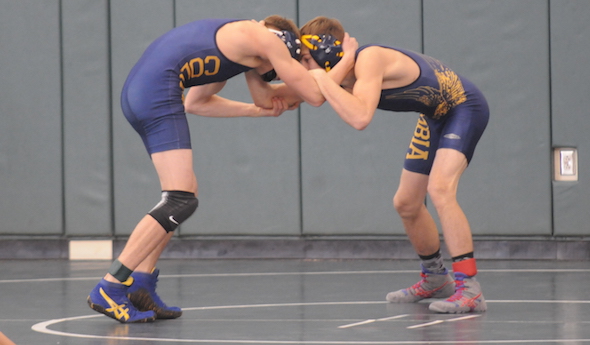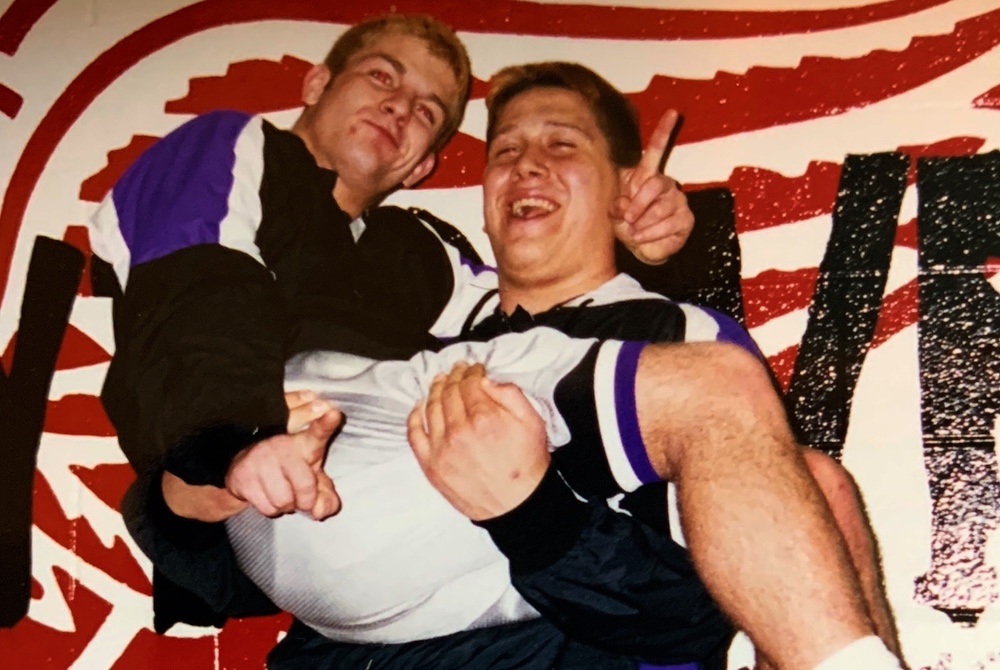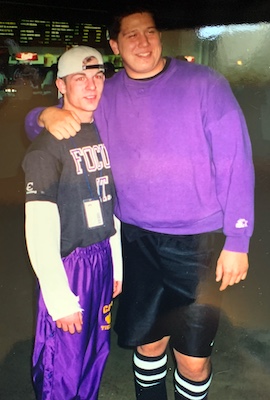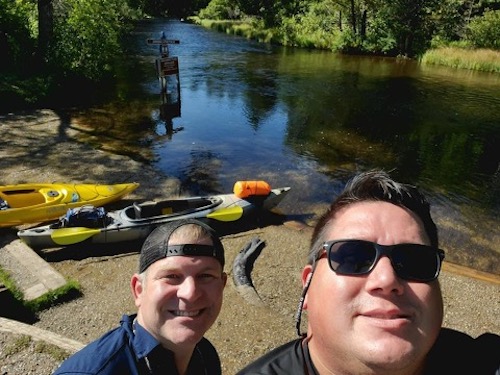
Brooklyn Twins Locked In After Scare
By
Chip Mundy
Special for Second Half
March 2, 2016
By Chip Mundy
Special for Second Half
BROOKLYN – A little more than a year ago, Cooper Gunnells’ greatest dream was thwarted by what turned into a horrible nightmare.
 A sophomore wrestler at Brooklyn Columbia Central at the time, Gunnells dreamed of qualifying for the MHSAA Division 3 Individual Finals at The Palace.
A sophomore wrestler at Brooklyn Columbia Central at the time, Gunnells dreamed of qualifying for the MHSAA Division 3 Individual Finals at The Palace.
He never got the chance in 2015, but he will be there this year as a Regional champion – and his twin brother will be there, too, in the same weight division.
In January of 2015, an illness – paired with a freak wrestling injury – turned into a nearly two-month stay in the hospital that threatened Cooper’s life.
“At first, we thought we’d lose him for a couple of weeks. Then it was, ‘Oh shoot, we’re going to lose him for the year,’ and then it was, ‘He might die.’ It suddenly put everything into perspective. Wrestling just didn’t seem that important anymore.” – Columbia Central wrestling coach Ron Guernsey
Cooper said he had a slight cold early in January, but it didn’t keep him from wrestling as it wasn’t a big deal. However, what happened in one match turned into a very big deal.
“My throat was a little dry because of the cold,” he said. “I got put in a headlock, and I think I went to pry up on this guy’s elbow to get away from him, and I felt a little rip in my throat, but I didn’t think anything of it. I just kept on wrestling.”
As the days went on, Cooper began to have trouble breathing. He noticed it during some of his matches.
“It hit me hard,” he said. “When I was wrestling one kid, I felt very fatigued. I couldn’t get my breath back. I was looking at my coach like, ‘What is going on? I’m not usually like this.’”
It also affected his sleep, and the only way he could get a decent night of sleep was to sit in a chair with his arms folded on the top of the chair to provide a little relief in his lungs.
After two trips to the emergency room – both times he was told he had mononucleosis – things got worse.
“The moment I really started to feel like something was really serious was when I started having shallow breaths and couldn’t really breathe that well,” Cooper said. “My chest really, really hurt; it hurt to the touch.
“I called my dad and told him that something was really wrong; he needed to come get me, and we needed to go to the hospital now. It was like nine or 10 o’clock at night. They hooked me up to an EKG, and they looked at me, then looked at the machine again, and said, ‘You need to get to U of M pronto.’ I didn’t know what was going on.
“All I remember from that point on is they hooked me up to a morphine bag. They started pumping me full of morphine, and I just kind of dozed off to sleep. I was there, but I wasn’t. I remember like little periods of that whole incident.”
The “rip” he had felt in his throat was actually a tear in his esophagus, so when he ate or drank, everything spilled into his lungs and chest cavity, causing an infection.
“If we had waited another day or two, from what the doctor said, the outcome wouldn’t have been very good,” said Cooper’s father, Scott Gunnells.
Cooper was in the intensive care unit as the doctors battled the infection.
“It was just a weird set of circumstances that brought it about,” Guernsey said. “Once it got into his lungs, they had to go in two different times to scrape his lungs.
“It was a big deal. They were pumping him with antibiotics, and he went from 125 pounds to 100 pounds. It was hard to even look at him.”
Cooper’s twin brother, Keenan, had a similar feeling.
“It was really scary,” Keenan said. “I didn’t even want to go to the hospital to see my brother in the condition he was in. It was hard.”
As Cooper lay in the hospital, he really was unaware of his condition or the severity of it.
“At first, when I starting coming to, I was bloated full of fluids and had chest tubes in me,” he said. “I was like, ‘What is going on?’ I had a whole bunch of IVs in my arm. The doctors came in and told me I ripped my esophagus and everything I was eating and drinking was going to my chest cavity. It made this thick mucus inside my lungs, and then the pericardium (sac around your heart), that was full of fluids, too.
“I had tubes going in my neck down into my chest area and tubes from both sides of my chest that was draining out all of the junk that was inside of me.”
He also was incubated with a breathing tube.
“The thought came to my head that I might never wrestle again, but I really wanted to wrestle.” – Cooper Gunnells
When Cooper was first released about six weeks after going into the hospital, he returned after just eight hours and stayed another week.
While in the hospital, his spirits were lifted when the Michigan State University wrestling team sent a signed shirt, and three members of the University of Michigan wrestling team visited him in the hospital.
“That was really cool,” Cooper said. “I asked them about their go-to moves and stuff like that, and they said to ‘stick to the basics.’”
A return to wrestling was going to be a big step for a young man who had dropped 20 percent of his body weight from 125 to 100 pounds, and the doctors put him on a 4,000-calorie diet – maybe the only good thing that happened to Cooper during that time.
“It was great actually,” he said. “I splurged on ice cream and chocolate milk. They had these calorie bags that they would open and pour into my chocolate milk. It’s like 1,000 calories each.”
 Cooper got out of the hospital in time to see his twin brother, Keenan, nearly advance to the MHSAA Tournament. He lost by one point in his final match in the Regional.
Cooper got out of the hospital in time to see his twin brother, Keenan, nearly advance to the MHSAA Tournament. He lost by one point in his final match in the Regional.
During the season, Keenan normally wrestles at a different weight class than Cooper so both can get into the lineup, but that was not necessary when Cooper was sidelined last season. But Keenan felt like he was wrestling for his stricken brother and made some changes to honor him.
“I was wrestling for him for sure,” Keenan said. “He made me try harder. Actually, at two tournaments, I bumped up to his weight class and took first at that level. I did it for him.”
Cooper never lost his desire to get back to wrestling. He returned to the mat near the end of the WAAAM (Wrestling Amateur Athletic Association) season.
“My dad told me I couldn’t wrestle at first,” Cooper said. “He just said, ‘We’ll see where you are in a couple of months.’ It was two weeks before WAAAM ended when I wrestled in WAAAM. I was huffing and puffing; it was hard to breathe.
“Keenan took first in WAAAM and I took eighth, but it was a learning process and had to start somewhere.”
Cooper played on the soccer team last fall to help build up his cardio, and he was relentless in his work to get back in wrestling shape.
“He worked so much harder when he got out of the hospital to get back where he is now,” Keenan said. “Those late-night runs, while I’m sitting on the couch doing cookie curls – eating cookies while he’s out running and busting his butt – just to know where he’s at now, I’m so proud of him.”
Cooper said he feels like he is 100 percent in all areas except endurance.
“I would say I’m 100 percent now strength-wise, but cardio-wise no,” he said. “Those months of being in bed – I couldn’t even walk down the hallway and back.”
Cooper is back. He is seeded first at 125 pounds in Division 2, and he brings in a record of 38-3.
But there remains one unique twist to the story.
“My little brother beat me.” – Keenan Gunnells, on losing to Cooper in the Regional Semifinals two weeks ago
Although Keenan had wrestled at 130 pounds most of the season, he dropped down to 125 for the Regional in an attempt to reach The Palace.
Obviously, that set up the possibility of the twin brothers meeting each other officially for the first time. It was a situation that was tough to face, and it ended up becoming a reality in the Regional Semifinals.
Not everybody wanted the match to take place.
“I told them not to do it,” Scott Gunnells said. “I didn’t want them to wrestle, just flip a coin and save the energy for someone else. Somebody had to lose anyway, and whoever loses has to wrestle harder to get back in.”
Cooper had similar thoughts.
“I really didn’t want to wrestle him because he’s my brother,” he said.
Keenan, who likes to remind Cooper that he is 4 minutes older, was a little more for settling things on the mat.
 “It was hard, but it was fun,” Keenan said. “Coach Guernsey gave us the chance not to wrestle. I could have injury-defaulted out of the match and then dropped back down, but I wanted to take first or second to move on, so why not wrestle for it? Who’s the better wrestler?
“It was hard, but it was fun,” Keenan said. “Coach Guernsey gave us the chance not to wrestle. I could have injury-defaulted out of the match and then dropped back down, but I wanted to take first or second to move on, so why not wrestle for it? Who’s the better wrestler?
“It went to overtime, and he got the last takedown, so my little brother beat me.”
While Cooper went on to win the Regional title, Keenan regrouped and finished third to earn a spot at the Finals with a 38-10 record. And a repeat meeting could happen again.
Both are seeded high, and a rematch could take place in the Semifinals or possibly even the Final. With a championship at stake, the twin brothers have a little different outlook.
“It’s a no-mercy kind of thing,” Cooper said. “That’s what we kind of did at Regionals, but now that we’re in states, we’re going to go at it if we meet.”
Keenan would love to reverse the outcome of the last meeting, but either way, he is really pleased to be there with Cooper.
“It’s kind of neat,” Keenan said. “Say Cooper and me both make it through our brackets, we could meet in the Finals. Twins in the Finals? I’m pretty sure everyone would be watching us and not caring about the other matches that are going on.
“I really wanted to make it to state, but it makes it 10 times better to know that my brother will be there with me on the mat while I’m wrestling.”
“I learned that you can’t take life for granted.” – Cooper Gunnells
Cooper said even he is surprised to be where he is today after the terrible ordeal.
“I would have thought it was going to take way longer for me to recover,” he said. “I was like 101 pounds.”
Scott Gunnells reflects on the past year and remembers the pain and worry. He also said he will never forget the support from the community.
“They had a big spaghetti dinner last year, and people showed up who I didn’t even know,” he said. “The community was great, and the outgiving of the community and the sacrifices of the coaches will always be in my mind.
“I don’t care who wins or loses. They are both coming home and both are going to eat at the same table. It doesn’t matter to me.”
The Gunnells brothers have another year to wrestle in high school, and wrestling in college is something both would like to do.
When asked if he had any colleges in mind, Cooper gave an insightful answer.
“I want to wrestle in college and I am hoping to go to Western Michigan because they have a nursing program,” he said. “After going through everything, I think it would be cool to be able to help people.
“You can’t take life for granted. Going through the ICU and seeing some people who were much worse than me, that was pretty painful, too.”
 Chip Mundy served as sports editor at the Brooklyn Exponent and Albion Recorder from 1980-86, and then as a reporter and later copy editor at the Jackson Citizen-Patriot from 1986-2011. He also co-authored Michigan Sports Trivia. E-mail him at [email protected] with story ideas for Jackson, Washtenaw, Hillsdale, Lenawee and Monroe counties.
Chip Mundy served as sports editor at the Brooklyn Exponent and Albion Recorder from 1980-86, and then as a reporter and later copy editor at the Jackson Citizen-Patriot from 1986-2011. He also co-authored Michigan Sports Trivia. E-mail him at [email protected] with story ideas for Jackson, Washtenaw, Hillsdale, Lenawee and Monroe counties.
PHOTOS: (Top) Brooklyn Columbia Central twins Cooper (left) and Keenan Gunnells wrestle during a Regional Semifinal at Williamston two weekends ago. (Middle) Cooper, below left, Keenan and their coach Ron Guernsey. (Below) Keenan Gunnells faces Alma's Alex Rosas in a third-place match at the Regional. (Top and below photos by HighSchoolSportsScene.com.)

Caro Champs Find Common Ground Again as Mental Health Providers
By
Paul Costanzo
Special for MHSAA.com
July 8, 2021
Phil Millerov and Phil Niklowicz wanted to do more than simply defeat opponents when wrestling at Caro High School.
They wanted to dominate – physically and mentally.
 “We had this thing between us where we wanted to be done, and (opponents) didn’t want to come back on the mat with us,” Millerov said.
“We had this thing between us where we wanted to be done, and (opponents) didn’t want to come back on the mat with us,” Millerov said.
Twenty years later, both spend their days building people up. Millerov is a licensed professional counselor, while Niklowicz is a licensed therapist.
“I went out there looking to dominate and make sure it was known that I am the superior wrestler in all facets,” Niklowicz said. “I would try to run up as many points as fast as I can. I would teach the same thing when coaching, specifically with my nephew. You’re saying, ‘Listen, we want to break these people.’ Then the next day, in a therapy session, it’s like, ‘Let’s build up your self-esteem and set some goals to boost ourselves up.’”
The close friends and two faces of Caro’s surging wrestling program in the late 1990s now have very similar careers. Millerov – who finished second, third and first at 275 pounds in the 1998, 1999 and 2000 MHSAA Finals, respectively -- works in private practice at Transitions Counseling Service in Greenville, where he specializes in substance abuse disorders. He also has served as a Class 1 Fellow at the WK Kellogg Foundation.
Niklowicz – a two-time MHSAA Finals champion (1999 and 2000) and four-time placer – is working in private practice in Southfield, seeing mostly children. He also works in adult foster care with patients who have had traumatic brain injuries.
“He and I went and hiked Pictured Rocks at the beginning of May,” Millerov said. “And we joked about how nobody would have guessed that we’d be doing this now.”
That Millerov and Niklowicz are still close does not come as a surprise. Their friendship began when their wrestling careers did, as 6-year-olds in the Caro Growlers program. As they were becoming two of the state’s top wrestlers, they would share rides to tournaments, and their families grew close.
In high school, despite their size difference – Niklowicz wrestled at 135 his senior year – it wasn’t uncommon to see them warming up together.
“We were definitely easy going and liked to mess around a lot,” Niklowicz said. “We used to mess around before meets and throw each other. He would jump and I would throw him. People would look at us like, ‘Why is that little guy throwing that big guy?’”
 While their teams never made it out of the Regional, Millerov and Niklowicz helped set the stage for a program that would become among the best in Division 3 throughout the 2000s, qualifying for five straight Quarterfinals from 2003-07 and winning the Division 3 Finals title in 2003.
While their teams never made it out of the Regional, Millerov and Niklowicz helped set the stage for a program that would become among the best in Division 3 throughout the 2000s, qualifying for five straight Quarterfinals from 2003-07 and winning the Division 3 Finals title in 2003.
Individually, they were among the most well-known and feared wrestlers in the state.
“Niklowicz and I were fortunate to have each other, because we pushed each other,” Millerov said. “We were in constant competition with each other and ourselves. Just to kind of push each other, it was a great thing.”
Niklowicz finished fifth as a freshman and third as a sophomore before winning back-to-back titles to close out his career. In 1999, he defeated Nick Oertel of Goodrich 9-2 in the 125-pound final, and the next year he defeated Oertel’s teammate, Ryan Tripp, 7-5 at 135. Tripp would go on to win an individual title the following year. Niklowicz would finish his career with 214 victories.
“I think probably both (Finals titles) were equal,” Niklowicz said. “I think there was probably a little more stress going into my senior year. My motivation always came from improving, then it was maintaining the state title. You don’t want to go the opposite direction.”
Millerov lost a tight 6-4 decision against Remus Chippewa Hills’ Bob Kozlowski in the MHSAA Finals as a sophomore, and had an epic 12-10 match against future NFL defensive lineman Jason Babin of Paw Paw in the 1999 semifinals before fighting back to take third. The next year, he won his title via first-period pin against Dan Kliphuis, a two-time runner-up from Grand Rapids West Catholic. Millerov finished with 196 career wins and set the state record for pins in a career (160), which was broken the next season by Nick Simmons of Williamston and is now held by Justin Zeerip of Hesperia. The 56 pins Millerov recorded his senior season remains second all-time to Simmons, who had two seasons with 57.
“I never really thought about (the pin record) to be quite honest,” Millerov said. “It was just kind of in the background. It didn’t matter; all I cared about was winning this match, and I wanted to do it in the most effective, efficient way I could.”
They both continued their wrestling careers, but went their separate ways in college, with Millerov heading to Neosho County Community College in Kansas and Niklowicz to Virginia Tech.
Millerov had interest from several Division I schools coming out of high school, including some in the Big Ten, but he admits his grades weren’t good enough at the time. Neosho provided a chance to compete with some of the best in the country while at the junior college level, however, as the team took second at the National Junior College Athletic Association championships in 2002.
He transferred to Central Michigan after his sophomore year, joining his girlfriend – now his wife – who was already attending, and walking onto the wrestling team. While his relationship lasted, wrestling did not.
“I was distracted,” Millerov said. “My grandmother passed away in 2002 in that summer. I was trying to get that motivation back, and I just lost it. There has to be that edge with wrestling. When things didn’t work out, I struggled. Wrestling was my identity.”
Millerov was working to follow in his father’s footsteps and become a police officer. But the elder Phil Millerov, who died in 2012, talked his son out of it.
“Looking back on it, for me, it was obviously the right decision,” Millerov said.
The idea to go into counseling came after Millerov was married in 2006, as his wife had gotten into the program. He went back to school to earn his bachelor’s degree from CMU in 2007, and would go on to get his master’s from CMU, as well.
“I had taken a bunch of psychology courses just because I liked the field,” Millerov said. “I liked to be challenged. I liked puzzles, and with psychology, it’s like a new puzzle every hour. It just clicked. I flew through and graduated with like a 3.8. I was like, ‘Wow, I kind of feel smart.’ It was good to find something I was passionate about again.”
Millerov said he’s constantly learning and honing his craft, much like he did as a wrestler. A major difference now, however, is that he’s found more balance in his life.
“I think about working with athletes in addiction, I find a lot of similarities,” he said. “Wrestling was my life, it’s how I identified myself. I hear that same kind of talk around people struggling with addiction. One you’re considered successful for, the other you’re not. Most of my growth has been around finding balance. I find that my happiness and my clients’ as well, is when we found that balance instead of being good at just one thing. I want you to have passion, I want you to do things you love, but I also want you to be effective as a husband, a father, whatever other responsibilities you have.”
 Niklowicz’s journey to becoming a therapist was more telegraphed, as both of his parents work in mental health, and he said it was always something he wanted to do, as well.
Niklowicz’s journey to becoming a therapist was more telegraphed, as both of his parents work in mental health, and he said it was always something he wanted to do, as well.
He attended Virginia Tech on a wrestling scholarship, but transferred to Eastern Michigan after one year. The Hokies had recruited him to wrestle at 133 pounds, but when the team’s 125-pounder was injured, Niklowicz was asked to cut down further. Like Millerov, he struggled when his wrestling career ended.
“I just had a really bad taste in my mouth after leaving Virginia Tech and trying to cut all this weight,” he said. “Some of it was I had lost the desire to work out, to wrestle. Fifteen years, roughly, of my life was dedicated to wrestling, and once you stop, what do I do with my winters? What do I do with seven months of the year? It was definitely a part of my identity; that’s why I got into coaching. I did MMA fighting for a little bit to have something competitive.”
Like Millerov, Niklowicz said finding balance was important.
“In the mental health field, specifically, there’s a lot of burnout for people,” he said. “Every day, you’re listening to people talking about their problems, but at the same time, they’re coming for a reason and they’re there for help, so you have to provide that help and have to motivate yourself to come to the office every day and give it your best. I try to instill the motivation that I used to other people.”
When Niklowicz looks at his time as an athlete compared to his work as a therapist, he said that work ethic is the main characteristic that has carried over.
“I think my practice mentality was the same as it was on the mat,” he said. “Even in the wrestling room, these are people I’m friends with, people I grew up with, and I still didn’t want anyone to score on me. Then you just look at your work ethic outside of wrestling, whether you’re studying for exams or motivating yourself to get up and go to class.”
While they are no longer living in the same town or living similar lives – Millerov is married with three kids, while Niklowicz is single – the connection between Caro’s dominant duo remains strong, both professionally and personally.
“I don’t think we ever thought we would be going down such a similar path, and I doubt that either one of us grew up thinking we would do the exact same thing,” Niklowicz said. “We met when we were 6 years old, and we’ve been best friends forever. I think it’s hilarious that we’ve taken such similar paths but with some glaring differences. It’s definitely interesting that we’re still really good friends after 30-some years, especially since we’ve moved on and gone our separate ways.”
2020-21 Made in Michigan
June 28: Michigan's Minor Leaguers Making Up for Lost Season - Read
PHOTOS: (Top) Caro’s Phil Millerov lifts teammate Phil Niklowicz as both celebrate Division 3 championships during the 2000 Individual Finals at Joe Louis Arena. (Middle) Niklowicz, left, and Millerov were high school warm-up partners despite wrestling at significantly different weights. (Below) Niklowicz and Millerov take a selfie during a hiking trip to Pictured Rocks National Lakeshore in May. (Photos courtesy of Niklowicz and Millerov.)

